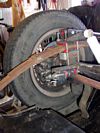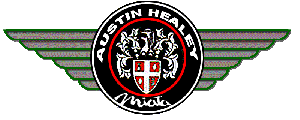 |
So,
now I have rear disc brakes, but I have a car that has stock rear suspension.
With increased horsepower comes some problems including axle spring wrap
and side-to-side axle movement during hard cornering. To combat these
problems, I need to make both "anti-tramp" or "traction"
bars to limit spring wrap, and a panhard rod to eliminate side-to-side
movement. Also, I'd like to lower the rear of the car a bit without resorting
to lowered springs. The ideal solution is to raise the front spring mount.
I just had to make new front spring hangers as shown here next to a stock
one. |
 |
Here you can
see the extra depth of the spring mounting holes. I've also left a tab
on the bottom of the spring hanger to attach the traction bars to. |
 |
Here's the
axle in the car, with the spring mounted into the new spring hangers.
|
 |
Rather than
use a heim joint, I chose to use urethane bushings to help keep noise
to a minimum. These are the bushings and the bushing holders I made. |
 |
The bottom
of the spring with heavy tabs welded onto the lower spring plate to attach
the traction bar to. |
 |
The traction
bar on the front spring hanger |
 |
A nearly completed
look at the bar. It will be cut and I will install a threaded adjuster
to allow for fine tuning of the rear suspension once the full weight of
the car is resting on the springs. With a slight adjustment I can be sure
to eliminate any binding that may occur. |
 |
Now I have
hopefully stopped spring wrap, and I don't want to use the stock lever
shocks. Rear shocks from a Dodge Colt should fit ok, and they are made
for a light car. Using shocks from a large car would provide too much
damping and a rough ride. |
 |
Many suppliers
sell a rear tube-shock conversion kit for a few hundred dollars, but why
spend when you can make! Just take a plate, drill holes to mount it to
the stock shock mounting holes and mark your tube shock location. |
 |
I made sure
to allow for full compression and rebound of the suspension without allowing
the shock to extend or compress completely. |
 |
Then I welded
some thick walled tube to the spring plates to mount the shocks and presto!
A tube shock conversion kit for less than $50. |
 |
Then comes
the panhard rod to limit lateral, or side-to-side movement of the rear
end during cornering. First is a strong mount on the chassis to take the
loads of the bar. I chose to weld a bracket to the frame under the sheetmetal
of the trunk, then gusset and repair the trunk after a firm, strong mounting
point had been made. |
 |
Here's the
shock mount, traction bar mount and a top view of the panhard mount on
the rear end. |
 |
I ran a gusset
bar off of the panhard bar frame mount to the sheetmetal on the opposite
side to provide some additional support. Getting all the clearances right
to avoid conflicts with the axle as it moves through all the suspension
travel took a little time and careful measuring. |
 |
Having the
panhard rod as long as possible allows the rear-end to move in an almost
straight line up and down. It will still transcribe an arc who's radius
is dictated by the length of the panhard rod, but with the added flexibility
of the urethane bushings, this should not be a problem. |
 |
This is the
plate welded to the panhard rod's lateral mounting gusset. |
 |
The nearly
finished rear suspension |
 |
The Panhard
rod mount on the rear axle |
 |
This is how
it looks with a wheel on the axle. Note the clearance for the brake rotor
and caliper |
 |
Here's the traction bars with
adjusters, all they need now is a lock nut and some paint. |
 |
I can't wait
to get the whole thing on the road! I've still got to get the adjusters
on the traction bars and figure out how to run cables for the parking
brake. |
 |
In case you
have not guessed, the car was upside-down for this whole fabrication project.
It sure was easier than crawling around on my back underneath the vehicle. |

